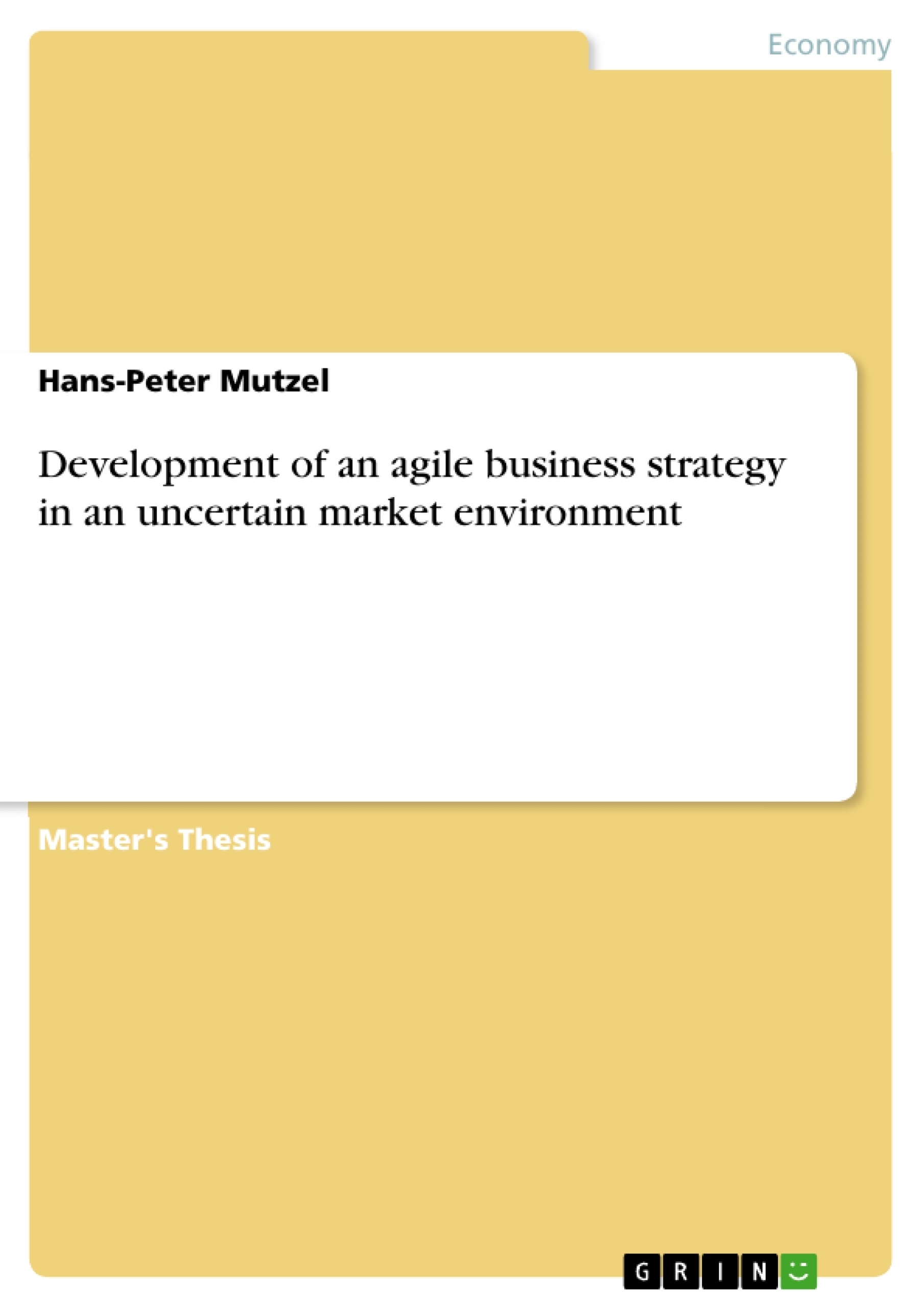Strategic decision-making is a key task for every senior manager of any sized company. Strategic decisions are characterized by highly uncertain conditions. Managing this uncertainty and anticipating the future, is seen as key to success and the measure for being a successful manager. In the opposite direction, if firms fail to anticipate how the future will be, it is then often called “bad luck”. However, if “failing to anticipate the future” were correlated with bad luck, this would mean that “anticipating the future right” should be directly linked with good luck. However, good luck is often ignored and seen as excellent management performance instead.
To reduce the influence of luck, this master thesis deals with the different approaches on strategy-formation and decision-making, to identify to what extent they differ in their methodology on how they manage the uncertainty and how they try to get control over the future. The aim is to identify best practice approaches that should lead to better performance on reduced risk and cost.
Inhaltsverzeichnis (Table of Contents)
- 1. Introduction
- 1.1 Problem description and research question
- 1.2 Aim of the paper
- 1.3 Methodology
- 1.4 Structure of the paper
- 2. Literature review and the general term definition
- 2.1 General Term Definition
- 2.1.1 Strategy
- 2.1.2 The market and competitive space
- 2.1.3 Uncertainty
- 2.1.4 Causation versus Effectuation
- 2.1.5 Prediction versus Control and Influence
- 2.1.6 Systemic Knowledge Management
- 2.2 Literature Review on different strategy approaches
- 2.2.1 Positioning as strategy formation
- 2.2.1.1 Classical Design-, Planning- and Positioning School
- 2.2.1.2 Typical causal strategy planning process
- 2.2.1.3 Adaptation and Learning in strategy formation
Zielsetzung und Themenschwerpunkte (Objectives and Key Themes)
This master's thesis aims to analyze different approaches to strategy formation and decision-making within uncertain market environments. The goal is to identify best practices that minimize risk and cost while improving performance. The research explores how various methodologies handle uncertainty and attempt to control future outcomes.
- Agile business strategies in uncertain markets
- Comparison of different strategy formation approaches
- The role of uncertainty in strategic decision-making
- Causation versus effectuation in strategy development
- Risk mitigation and cost reduction in strategic planning
Zusammenfassung der Kapitel (Chapter Summaries)
1. Introduction: This introductory chapter sets the stage for the thesis by defining the problem of strategic decision-making in uncertain environments. It establishes the research question, outlining the aim of the paper to identify best practices for developing agile business strategies that reduce risk and cost. The chapter also details the methodology employed and provides a roadmap for the structure of the thesis.
2. Literature review and the general term definition: This chapter provides a comprehensive overview of existing literature on strategy formation and decision-making. It begins by defining key terms such as "strategy," "market," "uncertainty," "causation," and "effectuation," providing a foundational understanding for the subsequent analysis. The chapter then delves into a review of different strategy approaches, exploring various schools of thought and their respective methodologies for handling uncertainty. This section lays the theoretical groundwork for the thesis by examining established models and frameworks for strategic planning and adaptation. It contrasts approaches that focus on prediction and control with those emphasizing influence and learning, setting the context for later comparisons and analysis of best practices.
Schlüsselwörter (Keywords)
Agile Business, Decision-Making, Start-up, Strategic Thinking, Strategy Development, Strategy Management, Uncertainty, Effectuation, The Lean Startup
Frequently Asked Questions: Comprehensive Language Preview
What is the overall purpose of this document?
This document provides a comprehensive preview of a master's thesis which analyzes different approaches to strategy formation and decision-making within uncertain market environments. It aims to identify best practices for minimizing risk and cost while improving performance.
What topics are covered in the Table of Contents?
The table of contents includes an introduction outlining the research question, aim, methodology, and structure; a literature review defining key terms (strategy, market, uncertainty, causation, effectuation) and exploring different strategy approaches (including classical design, planning, and positioning schools); and subsequent chapters (not detailed in this preview).
What are the key objectives and themes of the thesis?
The thesis aims to analyze different strategy formation approaches in uncertain markets, comparing them and exploring how they handle uncertainty and attempt to control future outcomes. Key themes include agile business strategies, the role of uncertainty in decision-making, causation versus effectuation, and risk mitigation/cost reduction in strategic planning.
What is the methodology used in the research?
The methodology isn't explicitly detailed in this preview, but it is mentioned as being covered in the introduction chapter.
What are the key findings or arguments (as summarized)?
Specific findings are not presented in this preview. However, the preview indicates that the thesis will compare and contrast different strategy formation approaches, examining how they address uncertainty and strive for effective outcomes. It will explore the concepts of causation versus effectuation in strategy development.
What are the chapter summaries?
The preview summarizes the introduction chapter, which sets the stage for the thesis and outlines its purpose, methodology, and structure. It also summarizes the literature review chapter, which defines key terms and examines different approaches to strategy formation, contrasting those that emphasize prediction and control with those focusing on influence and learning.
What are the key words associated with this thesis?
The keywords are: Agile Business, Decision-Making, Start-up, Strategic Thinking, Strategy Development, Strategy Management, Uncertainty, Effectuation, The Lean Startup.
- Citar trabajo
- Hans-Peter Mutzel (Autor), 2014, Development of an agile business strategy in an uncertain market environment, Múnich, GRIN Verlag, https://www.grin.com/document/286607



